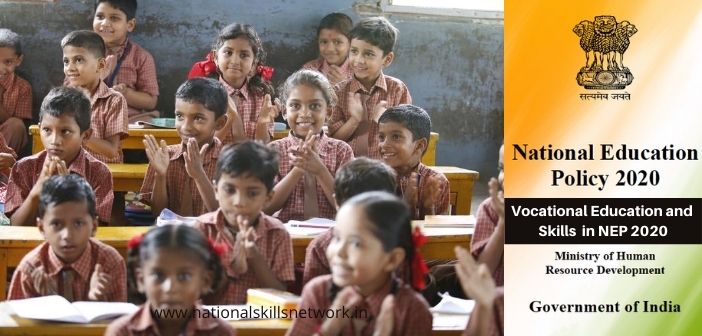The National Education Policy (NEP) 2020, envisaged for some transformational reforms in the Indian education system. It talks about the education system that lays emphasis on experiential learning along with a focus on 21st-century skills like critical thinking, problem-solving, etc. The policy expects that by the year 2020, at least 50% of learners through the school and higher education system shall have exposure to vocational education. Team NSN has analysed the National Education Policy 2020 and has come up with 10 important points to carefully consider with respect to vocational education and skills in NEP 2020.
 10 points to consider: Vocational education and skills in NEP 2020
10 points to consider: Vocational education and skills in NEP 2020
-
Vision for balanced education – Socially meaningful and aspirational
“No hard separations between arts and sciences, between curricular and extra-curricular activities, between vocational and academic streams, etc. in order to eliminate harmful hierarchies among, and silos between different areas of learning.”
-
Re-imagination of Vocational Education and sensitization for building competencies
“Vocational education is perceived to be inferior to mainstream education and meant largely for students who are unable to cope with the latter. This is a perception that affects the choices students make. It is a serious concern that can only be dealt with by a complete re-imagination of how vocational education is offered to students in the future.”
-
Inclusive, Interoperable, interdisciplinary and outcome-based education
“The fourth vertical of HECI will be the General Education Council (GEC), which will frame expected learning outcomes for higher education programs, also referred to as ‘graduate attributes’. A National Higher Education Qualification Framework (NHEQF) will be formulated by the GEC and it shall be in sync with the National Skills Qualifications Framework (NSQF) to ease the integration of vocational education into higher education.”
-
For 21-century capacity building
“A holistic and multidisciplinary education will help develop well-rounded individuals that possess critical 21st-century capacities in fields across the arts, humanities, languages, sciences, social sciences, and professional, technical, and vocational fields; an ethic of social engagement; soft skills, such as communication, discussion and debate; and rigorous specialization in a chosen field or fields.”
-
School internships for skill appreciation and craft-centric learning
“Every student will take a fun course, during Grades 6-8, that gives a survey and hands-on experience of a sampling of important vocational crafts, such as carpentry, electric work, metalwork, gardening, pottery making, etc., as decided by States and local communities and as mapped by local skilling needs.”
-
Professional development of teachers
“A common guiding set of National Professional Standards for Teachers (NPST) will be developed by 2022, by the National Council for Teacher Education in its restructured new form as a Professional Standard Setting Body (PSSB) under the General Education Council (GEC), in consultation with NCERT, SCERTs, teachers from across levels and regions, expert organizations in teacher preparation and development, expert bodies in vocational education, and higher education institutions.”
-
Integration of Vocational Education with Academic Learning and formation of NCIVE
“Vocational education will be integrated into all school and higher education institutions in a phased manner over the next decade. Focus areas for vocational education will be chosen based on skills gap analysis and mapping of local opportunities. MHRD will constitute a National Committee for the Integration of Vocational Education (NCIVE), consisting of experts in vocational education and representatives from across Ministries, in collaboration with industry, to oversee this effort.”
-
Job market orientation with multiple-entry and exit options
“The undergraduate degree will be of either 3 or 4-year duration, with multiple exit options within this period, with appropriate certifications, e.g., a certificate after completing 1 year in a discipline or field including vocational and professional areas, or a diploma after 2 years of study, or a Bachelor ’s degree after a 3-year program.”
-
Recognition of Prior Learning (RPL) and alignment with International Standards
“The National Skills Qualifications Framework will be detailed further for each discipline vocation and profession. Further, Indian standards will be aligned with the International Standard Classification of Occupations maintained by the International Labour Organization. This Framework will provide the basis for Recognition of Prior Learning.”
-
Technological development and student entrepreneurship
“Given the explosive pace of technological development allied with the sheer creativity of tech-savvy teachers and entrepreneurs including student entrepreneurs, it is certain that technology will impact education in multiple ways, only some of which can be foreseen at the present time.”
All the above 10 points are supported by references to the policy document available in the public domain.
Related Article: Highlights of the National Education Policy 2020 – Read More: https://nationalskillsnetwork.in/oldsite/highlights-of-the-national-education-policy-2020/
Subscribe to our YouTube channel for more updates:
Subscribe on YouTube



Comments 5